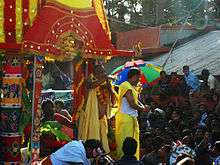Dahuka boli

Dahuka boli (Odia: ଡାହୁକ ବୋଲି, also "Dahuka gita" (ଡାହୁକ ଗୀତ)) are poetic recitations which Dahukas (or Ratha bhanda), the charioteer who recite during the Rath Yatra in Puri, Odisha. Ratha Yatra being a symbolic expression of fertility and Life cycle, these "boli" sung by the Dahuka contain bawdy songs. It is believed that unless the Dahuka boli is sung 'Ratha' doesn't move.[1] These songs are sung publicly without any kind of hold on the lyrics.[2] Dahuka controls the movement of Ratha during the festival.[3][4] This tradition is the remnant of Vajrayana Buddhism in Odisha and the lyrics bear the signature of the Vajrayana Buddhist poetry. The Dahukas are believed to be the descends of the famous 84 Mahasiddhas.[5]
| Part of a series on |
| Buddhism |
|---|
 |
|
Lyrics samples
| Oriya | English (transliteration) |
|---|---|
| ମାରି ଶାଶୁ ନଣନ୍ଦ ଘରେ ଶାଳୀ | māri sāsu naṇanda gharē sāḷi |
| ମାଅ ମାରିଆ କାହ୍ନୁ ଭଇଲ କବାଳୀ | māa māriā kāhnu bhaila kabāḷi |
| Oriya | English (transliteration) |
|---|---|
| ହୋ ଭଗତେ! ହୋ.. | hō bhagatē hō |
| କାଳୀ ଗୋରୀ ଦିହେଁ ଗାଧୋଇ ଗଲେ, | kāḷī gōrī dihē gādhōi galē |
| ଗଛରୁ ଖସିଲା ଡାଳ, | gacharu khasilā ḍāḷa |
| କାଳୀ କହୁଛି ଗୋରିଲୋ | kāḷī kahuchi gōrilō |
| ତୋ ବିଆରେ ନାହିଁ ବାଳ ॥ | tō biārē nāhi bāḷa |
| Oriya | English (transliteration) |
|---|---|
| ହୋ ଭଗତେ! ହୋ.. | hō bhagatē hō |
| ହାଡ଼ୁ ପା କହିଲେ ବାଇ ଏଠାର, | hāḍu pā kahilē bāi ēthara |
| ଯୋନି ଦରଶନ ସୁଖ ଅପାର । | jōni daraśana sukha apāra |
| ଭଗରେ ବାଜିଲେ ଲିଙ୍ଗର ମୁଣ୍ଡି, | bhagarē bājilē liṅgara muṇḍi |
| ତିନିଧାର ନାଳ ନିଅଇ ତେଣ୍ଡି । | tinidhāra nāḷa niai tēṇḍi |
| ଛ ଗଣ୍ଠି ଭେଦଇ ସେ ନାଳ ଯେବେ, | cha gaṇṭhi bhēdāi sē nāḷa jēbē |
| ରମଣ କରିବୁ ଭଗତେ ତେବେ ॥ | ramaṇa karibu bhakata tēbē |
History
"Dahuka boli" have many derivatives from Charyapada. One of the earliest Dahuka boli by Kanhapa is as follows:
ମାରି ଶାଶୁ ନଣନ୍ଦ ଘରେ ଶାଳୀ
ମାଅ ମାରିଆ କାହ୍ନୁ ଭଇଲ କବାଳୀ
Roman transliteration:
māri sāsu naṇanda gharē sāḷi
māa māriā kāhnu bhaila kabāḷi
In the "Swatwalipi (Odia: ସ୍ୱତ୍ୱଲିପି) or Adhikara abhilekha (Odia: ଅଧିକାର ଅଭିଲେଖ) service no 104 there is the description of Dahuka and their service on "Ratha"[7] There is no description of such service in "Purusottama mahatmya" in Skandha purana. But there are descriptions of "Dahuka" in Purusottama Karmangi.[6][8]
Text from Purusottama Karmangi
| “ | ଏ ଭୂଇଁ ଭୋଗୀ। ଏମାନେ ରଥବେଳେ ରଥ ଚଳାଇବେ। ମୋଡ଼ ବୋଲିବେ। ଅକଥା କହି, ପରମେଶ୍ୱର ରଥ ରୋକି, ରଥଗତି ଉଣ୍ଡି, ବେତ ଚଳାଇ ମୋଡ କଥା କହିବେ। ସେ ସମସ୍ତ ଚାଳିବେ। କଳା ବେଠିଆ ରଥ ସେହିମତେ ଚଳାଇବେ।” | ” |
| — Purusottama Karmangi[8] | ||
The boli/dahuka boli were also called as "Tucha pada" (ତୁଚ୍ଛ ପଦ), "Bhanda gita" (ଭଣ୍ଡ ଗୀତ) or "Bakra gita" (ବକ୍ରଗୀତ). During the earlier 20th century Jagadeba Mishra, a poet from Puri has written about the "Dahuka boli" his book "Sahari jalam":
| Oriya | English (transliteration) |
|---|---|
| ରଥେ ଭଣ୍ଡ ଡାକ ଛାଡନ୍ତେ ଡାହୁକ | rathē bhaṇḍa ḍāka chāḍantē ḍāhuka |
| ବକ ସିଆଣିଆ ଲୋକ | baka siāṇiā lōka |
| ଅରକ୍ଷିତ ଯାକ ଶୁଣିବାକୁ ରଙ୍କ | arakhita yāka suṇibāku raṅka |
| ନମାନିଲେ ଶୋଷ ଭୋକ | namānilē sōsa bhōka |
Ban on Dahuka boli
During 1995 The Jagannatha temple trustee officials banned the recitation of Dahuka boli. Apart from few exceptions since 1997, Dahukas never sung Dahuka gita.[6]
See also
References
- ↑ The Eastern Anthropologist. Ethnographic and Folk Culture Society, United Provinces, Anthropology Laboratory, Lucknow University. 2001.
- ↑ Surendra, Mahanty (1982). Lord Jagannatha: the microcosm of Indian spiritual culture. Bhubaneswar, Orissa: Orissa Sahitya Akademi. p. 93.
- ↑ B. B. Jena (1980). Orissa, people, culture, and polity. Kalyani Publishers. p. 313. Retrieved March 26, 2012.
- ↑ Sarat Chandra Mahapatra. Car Festival of Lord Jagannath, Puri. Puri, India: Sri Jagannath Research Centre (Purī, India). Retrieved March 26, 2012.
- ↑ Siddheswar, Mohapatra (2006). Puri Boli. Orissa Sahitya Akademi. p. 366.
- 1 2 3 4 Asit Mohanty. ରଥେ ଭଣ୍ଡ ଡାକ ଡାକଇ ଡାହୁକହେ ଭଗତେ ହୋ. The Sunday Indian (In Oriya). July 20, 2011
- ↑ "Swatwalipi". Service clause no. 104
- 1 2 Purusottama Karmangi
External links
- ପ୍ରାଚୀନ ଡାହୁକ ବୋଲି ବନ୍ଦ ହେବ କାହିଁକି? (In Oriya). The Sunday Indian. July 18, 2011
- Mohanty, Dhrutikama‘ଡାହୁକ ବୋଲି'-ସତରେ କ'ଣ ଅଶ୍ଳୀଳ? (In Oriya). The Sunday Indian. July 12, 2011
